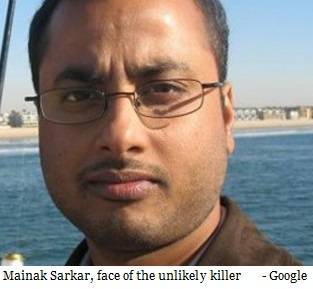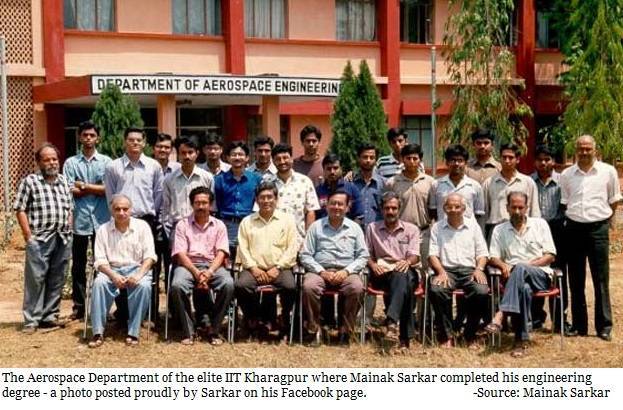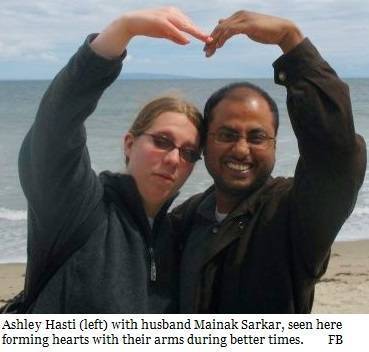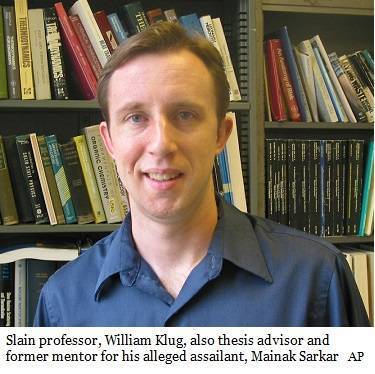UCLA Shooting: IIT Topper’s ‘Long Dark Tunnel’

“You can have a PhD or you can be a little kid, you could be black or white, brown or Asian … and gun violence has just become too acceptable. We’ve become immune to it.”
– Eric Garcetti, Mayor of Las Angeles
By Sid Atanya & SB Veda
Prior to June 1st, if you googled IIT Kharagpur, you’d most likely be pointed to the web-site of India’s most prestigious technical institute. But doing the same, today, will generate a list riddled with links to a heinous killing spree in the United States.
That’s because the perpetrator of a double homicide, Mainak Sarkar, 38, was an alumnus of the reputed Indian Institute of Technology, Kharagpur. Before allegedly killing his wife, Ashley Hasti, 31 and UCLA Ph.D. thesis advisor, William Klug, 39 and then turning the gun on himself, he was living the Indian dream.
That dream ended in a twisted nightmare when Sarkar, apparently, after fatally shooting his estranged wife in the head at her home in Minnesota, drove over 3,000 kilometers in his gray Nissan Sentra carrying two semi-automatic weapons to Las Angeles where he shot and killed Professor Klug. Glug had headed the research team of which Sarkar was a member, years back.
 The Las Angeles Police Department (LAPD) said he had a ‘kill list,’ which led their colleagues to finding Hasti’s body at her home in Minnesota. The list contained another name, which was not released by police. He, like the slain Professor Klug, is a faculty member at the University of California at Las Angeles (UCLA).
The Las Angeles Police Department (LAPD) said he had a ‘kill list,’ which led their colleagues to finding Hasti’s body at her home in Minnesota. The list contained another name, which was not released by police. He, like the slain Professor Klug, is a faculty member at the University of California at Las Angeles (UCLA).
Perhaps wanting police to find the body of his wife, Sarkar’s suicide note read, ‘Please check on my cat.’ Hasti, with whom he had lived until recently, was known to have a pet cat.
It is not definitively known why Sarkar killed his partner, Hasti. Though not living together, they had not been divorced. Neighbors had noted that there were no disturbances when Sarkar was observed at her home. She lived with her father in a quiet neighbourhood called Brooklyn Park. Sarkar who had worked remotely for a rubber company as a software developer and engineering analyst, was seen at the home though the two were known to be estranged for over a year.
With Klug, the motive for the crime is less murky. Sarkar had accused his former Ph.D. thesis advisor of intellectual property theft. On Sarkar’s (now deleted) blog, he had written that Klug had stole his code and gave it to another student. Whether totally delusional or with by applying perverse logic, he was seeking revenge for an act of academic theft, the consequences were tragic. And, in Sarkar’s case, the story is utterly astonishing: Sarkar’s life trajectory from India to America had pointed in a direction totally opposite to where he ended up, for his accomplishments were what the majority of Indian students aspire to achieve.
A MODEL STUDENT AND TRUSTED EMPLOYEE
Until recently, Sarkar was the picture of success. He’d been a topper at his school, St. Michael’s in Durgapur, West Bengal, and seemed destined for great things.
A shocked, Lily Chowdhury, one of Sarkar’s former teachers, recalled the future murderer to be a model student: “He was a very brilliant student, a meritorious student, I should say. He was one of the toppers of the class. He was a pride of our school,” she said.
“We never had any problems with him. So, the news that I got is very shocking,” said Chowdhury.
Still, as Chowdhury elaborated, she described a student not quite at ease among his fellow students. “I knew him till his ICSE. He was reserved, not the very outgoing type. I should not say that he was an introvert. But yes, he was not the type who would go around and make friends very quickly,” she said.
One of the friends Sarkar did make in Durgapur, concurs with Chowdhury’s assessment of him. “He was a good student, a good boy. He was good in sports. But he did not venture out of home often. He was absorbed in his studies,” said the friend who asked to remain anonymous.
After completing his higher secondary education, the studious Sarkar’s star rose with his stellar performance on the hyper-competitive All-India Joint Entrance examinations for Engineering. His results earned him a place at the prestigious Indian Institute of Technology, Kharagpur. The IITs are world-renowned, and known to be meritocracies. Even Indira Gandhi failed to influence the administration of the institutes to admit her son Rajiv when her father, Jawaharlal Nehru was Prime Minister of India. Nehru facilitated a meeting with one of the IIT directors and then famously left him alone with this daughter; it was diplomatically suggested to her that she try Oxford or Cambridge where the pedigree of a student rather than mere grades can determine suitability of the candidate. Gandhi was accepted at Cambridge to study engineering but did not finish.
Among the notable allumi of IITs are billionaires R. Narayan Murthy, founder and Chairman of Infosys where Sarkar worked in the early 2000s, Nandan Nilekani, another co-founder of Infosys, and Vinod Khosla, founder and CEO of Sun Microsystems.

Sarkar graduated 2000, and impressed faculty along the way. “Mainak was a brilliant student. He remained busy with studies and did not talk or socialize much,” a professor of the IIT Kharagpur aerospace department told Hindustan Times.
Like many graduates from IIT, he was snapped up by the outsourcing powerhouse, Infosys, and spent just over a year at the company’s main campus in Bangalore. In 2002, he entered the US on a student visa for a research fellowship at the University of Texas at Arlington. He then applied and was accepted to the Master of Science program in Aeronautics and Astronautics at Stanford University in Silicon Valley at Palo Alto, California. He went back to U.T at Arlington to work in research at various points between 2003 and 2005.
He worked as a software developer for Lucid Technologies, afterwards, but it wasn’t enough to satisfy his ambition.
In 2006, he pursued advanced studies at University of California, Los Angeles (UCLA), where he graduated with a PhD in mechanical engineering in 2013. Professor William S Klug was his advisor at UCLA. Sarkar’s 121-page dissertation was on ‘Coupled Cardiac Electrophysiology and Contraction using Finite Element’. It took him seven years to complete his Ph.D., and afterwards, he thanked his future victim in writing, calling him a mentor.
Working as an engineering analyst for Endurica LLP, a rubber company, based in Ohio, Sarkar earned accolades from company president, William Mars, who had appreciated the quality of his work as well as his approach to problem solving. On Sarkar’s Linkedin page (now taken down), Mars, in recommending Sarkar, remarked, “Mainak is a steady contributor with solid technical skills in FEA and software development. He has worked for Endurica in an off-site situation requiring great trust and independence, and he has performed well under those conditions.”
SARKAR’S PESONAL LIFE
While living in California, he met and began dating Ashley Hasti, who was studying Asian languages. The couple got married in 2011 in a civil ceremony. While working for Endurica LLP, mostly from home, he lived with her at her Brooklyn Park apartment most of the time. Neighbors had seen the couple together, and remarked that nothing seemed out of the ordinary. There were no fights, no emergency 911 calls disturbing the neighbourhood.
 Hasti was outgoing and known to have a great sense of humor while Sarkar was more reserved but amicable. Photos of the pair covered their Facebook wall. One picture shows them forming a heart with their arms while holidaying at a theme park and on a beach. Even, Hasti’s sister’s Facebook profile contained images of the couple.
Hasti was outgoing and known to have a great sense of humor while Sarkar was more reserved but amicable. Photos of the pair covered their Facebook wall. One picture shows them forming a heart with their arms while holidaying at a theme park and on a beach. Even, Hasti’s sister’s Facebook profile contained images of the couple.
Like her husband, Hasti had ambitions of pursuing higher studies. She gained admission to medical school in 2012. The two seemed to be ‘typical geeks.’ She even liked to indulge in science jokes.
But Hasti’s great aunt, Charlane Bertsch, told the Los Angeles Times the couple never seemed committed and only lived together for about a year. She said she didn’t know of any bad blood between the couple but the two led fairly separate lives most of the time.
“He did his thing. She did hers,” she told the newspaper.
Still, this kind of arrangement is not unusual in today’s modern world where people have jobs in different cities, and stay in touch over instant messaging, Skype and other media. But in the last few months, something seemed to be amiss.
THE LONG DARK TUNNEL
By 2016, Sarkar was no longer seen at Hasti’s house, and it was clear to all who knew them that the marriage was over. Her grandmother was recently quoted as saying that Hasti wanted a divorce but couldn’t afford one.
In March, he was posting despondently to a blog he’d started called ‘The Long Dark Tunnel,’ in which he accused his thesis advisor, Klug of stealing his intellectual property (computer code) and giving it to another student. He also called Klug a ‘sick person,’ and waxed darkly about how those close to an individual is in a position to do them the most harm.
“William Klug, UCLA professor is not the kind of person when you think of a professor,” Sarkar wrote. “He is a very sick person. I urge every new student coming to UCLA to stay away from this guy. He made me really sick. Your enemy is your enemy. But your friend can do a lot more harm. Be careful about whom you trust.”
The LAPD chief of Police, Charlie Beck said that while Sarkar’s online postings contained “some harsh language,” there was “certainly nothing that would be considered homicidal.” He also remarked that was not initially known whether Klug or other professors expressed concerns about Sarkar to anyone at UCLA.
“Ironically, Sarkar’s dissertation in Biomechanics was meant to use engineering principles to understand and elucidate the mysteries of the human heart. It had brought him and Klug closer, and yet, neither could have predicted the cleavages that a fundamental misunderstanding of the heart and mind, would cause.”
At the same time, LAPD said Sarkar likely harbored such feelings for a few years but that, after speaking to university officials, they found the accusations to be unfounded. After the murder, the LAPD, not known to be a colour-blind organization, seem unwilling to investigate non-white Sarkar’s claims further. Perhaps it makes little difference, now.
UCLA officials were quick to discredit Sarkar. One faculty member called Sarkar ‘subpar,’ and said Klug had been a generous advisor to him. Klug’s survivors, with remarkable promptness, put together a website to raise money after Klug’s death, despite the family being well-off.
On the website, the family inaccurately claimed Klug was killed by a student who was “despondent about his grades,” and this falsehood was picked-up by many news outlets quick to publish any motive for the mysterious shooting. To those familiar with the alumni of elite institutions such as the IITs and Stanford, claims that Sarkar wasn’t up to the mark, seem hollow.
 In fact, it is more difficult to gain admission to an Indian IIT than an Ivy League school in the USA. Students have to sit through a two-part exam that has become among the most competitive in the world. In 2014, 1.36 million students took the entrance test for 9,784 available IIT seats – an acceptance rate of 0.7%. Harvard’s acceptance rate that year was nearly 7%.
In fact, it is more difficult to gain admission to an Indian IIT than an Ivy League school in the USA. Students have to sit through a two-part exam that has become among the most competitive in the world. In 2014, 1.36 million students took the entrance test for 9,784 available IIT seats – an acceptance rate of 0.7%. Harvard’s acceptance rate that year was nearly 7%.
But Sarkar was known to be stubborn and unreceptive of criticism. Jeff Eldredge, a close friend and colleague of Klug said that when he submitted a dissertation that advisers returned, requesting significant revisions, Sarkar did not take the feedback positively.
“He was rather combative in his responses,” Eldredge said. “He’d say, ‘I don’t know how to answer that’ or ‘I don’t know what that means.’ He was just very stubborn.”
At the same time, Eldredge did not think Sarkar to be unbalanced or dangerous. Rather, he recalled the student to be “a nice guy going through the same anxieties and struggles as anyone else.” Klug, according to Eldredge, advocated to colleagues on Sarkar’s behalf to grant the Ph.D., despite concerns over the quality of the dissertation.
Ironically, Sarkar’s dissertation in Biomechanics was meant to use engineering principles to understand and elucidate the mysteries of the human heart. It had brought him and Klug closer, and yet, neither could have predicted the cleavages that a fundamental misunderstanding of the heart and mind, would cause.
When Sarkar left UCLA, doctoral degree in hand, he was grateful to Klug and wrote as much. But, a year later, in 2014, his life started to unravel. Problems relating to his wife escalated, and couple split. Hasti’s grandmother said Sarkar didn’t appreciate her sense of humour, and got upset when she teased him. “They just didn’t get along,’ she told Minneapolis Star-Tribune, a local newspaper run out of in Minnesota.
The same year, Sarkar left his job at Endurica. Company president, William Mars confirmed this to the press but refused to elaborate on the reason why. Whatever it was, it didn’t prevent Mars from recommending Sarkar on linkedin, and praising the quality of his work as well has his ability to handle pressure.
The next two years are something of a mystery. Not much is known about his whereabouts or activities, and if there are people who knew him during this period, none have offered comment.
THE PSYCHOLOGY OF AN UNLIKELY KILLER
The mystery behind the double-homicide may not be that hard to explain. Sarkar had huge expectations for success. IIT alumni are the cream of the crop of students, and the overwhelming majority go on to great success. It counts billionaires, bank presidents and statesmen among the crop.
The culture of these institutions drive graduates to seek employment in that Mecca for success, known as America. Sarkar followed this beaten path with a haste.
Despite receiving advanced degrees even from reputed institutions in the USA, he failed to improve his social status. To add insult to injury, his wife, who was merely a language graduate when he met her, had elevated her status to that of future doctor, with earning potential greater than him. According to her grandmother, she teased Mainak, and he didn’t take it well.
“..individuals from low-status groups (e.g. ethnic minorities) tend to engage in more vigilant psychological self-protection than those from high-status groups. Sarkar may have done this to extreme.”
The oft-described loner, Sarkar, was already ill at ease, socially, and neither took well to criticism or teasing. For an IIT graduate, to be belittled by a plain-looking language graduate in a parochial locality in the US must have been humiliating. This too occurred while he was working a mediocre job at a rubber company in an insecure environment and driving an old beat-up car while others who’d studied with him were making good money, setting down roots. His thesis advisor was only a year older than him, and (in another life) might well have been peer rather than academic adjudicator.
A 2007 article in Scentific American on failure to meet expectations and how it motivates violence, quoted Nobel Laureate economist, John Harsanyi, on human motivation. He said that “apart from economic payoffs, social status seems to be the most important incentive and motivating force of social behavior.”
If an improvement in social status was at the heart of Sarkar’s mountainous climb in his life’s journey, all the hard work and sacrifice might have seemed, towards the end, as all for nothing.
Renowned neuroscientist, Michael Gazzaniga, has noted, “When you get up in the morning, you do not think about triangles and squares and these similes that psychologists have been using for the past 100 years. You think about status. You think about where you are in relation to your peers.”
Klug, being so close to Sarkar in age may have caused feelings of inferiority to arise. And, whether real or imagined, if Klug had given away his code, he would have felt deeply betrayed. With feelings of underachieving and jealousy stewing for years, the news that a peer had exceeded his status in a field where Sarkar had done work, could well have caused him to be unhinged.
If he perceived Klug as the source of this injustice, this twisted logic would have him directing his anger at his thesis advisor, only a year older than him. His wife, too, was a peer of sorts, who had risen as while he supported her financially. Her good-natured ribbing would have been seen by him as ungrateful belittling, and it might well have triggered rage.
Psychologist PJ Henry at DePaul University recently published an article demonstrating that low-status individuals have higher tendencies toward violent behavior, explaining these differences in terms of low-status compensation theory.
While in India, Sarkar had been a high status IIT grad, working at software giant, Infosys. But in the USA, being an immigrant and ethnic minority in a predominantly white society and failing to elevate his economic status, Sarkar surely fell within a low-status category. In his work, Henry demonstrated that individuals from low-status groups (e.g. ethnic minorities) tend to engage in more vigilant psychological self-protection than those from high-status groups. Sarkar may have done this to extreme.
Recently, due to a spate of suicides, the IIT council convened a session to examine the impact of hyper-competitiveness. India Today, one of India’s widely read weekly magazines reported on the findings: “There is a lot of concern over the spate of suicides at the IITs, not just in the campus, but outside as well” The article quoted best-selling alumnus Chetan Bhagat on the issue: “The hyper competitive nature of the students, loss of perspective, all toppers. Someone has to come last in IIT. There is a lot of stress and I think institutes should keep an eye on that”
That Sarkar, despite his academic pedigree, and with all that pressure, could not better his financial condition or garner him acclaim amongst his peers, was surely a cause of extreme disappointment in his life. Whatever happened to him in those two missing years likely evolved disappointment into delusion; those who had been closest to him became targets to tragic consequences.
GUN VIOENCE DEBATE
The shooting has sparked activity on the long running debate on gun-control in the United States. Recently, conservative commentators have said that, as the guns were obtained by Sarkar, gun control laws don’t prevent crime. But LA mayor, Eric Garcetti doesn’t agree, saying guns are far too available in American society – and this leads makes killing or wounding others much easier.
Garcetti said on Thursday that the deadly shooting at UCLA was a reminder of how endemic gun violence had become in the United States, where firearms claim around 30,000 lives each year.
“When guns are so easy to get, when that violence continues to play out on our streets, we have to speak up and speak out — have smart legislation to try to prevent that where we can,” he told reporters.
“You can have a PhD or you can be a little kid, you could be black or white, brown or Asian … and gun violence has just become too acceptable. We’ve become immune to it.”
If the rest of the US is immune, the Indian American community is reeling in shock. That one of their finest could perpetrate such horrible crime is a cautionary tale that will not long be forgotten.
 The Global Calcuttan Magazine
The Global Calcuttan Magazine